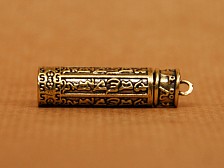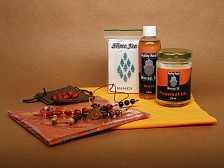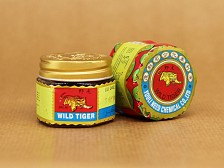
|
Ayahuasca Vine necklace
|
Handmade Ayahuasca Vine necklace, decorated with a slice of Ayahuasca Vine, seeds and beads. Each necklace is unique, so you might not get the exact one from the picture. |

|
Beaded Belts Shipibo
|
Beaded belts depicting designs inspired by Shipibo embroidery. These large handmade art pieces can suit as a belt or as a decorative ornamental piece for on your altar. Approximately 6000 coloured glass beads are used to create the pattern. Handcrafted in Indonesia. Various sizes and colour variations available. |
15 Forms |

|
Brass Cylinder Pendant
|
Cast in brass with Tibetan-style script and a row of Dorje symbols, the pendant carries both spiritual symbolism and practical use. Its screw-top lid reveals a hidden compartment, ideal for storing precious substances such as Rapé. |

|
Brass Snake Pendant
|
These brass snake pendants come in two distinct styles—one with a coiled body and the other featuring a dramatic snake head. |
2 Forms |

|
Gift set - Beauty
|
Give the gift of beauty with our unique combination of luxurious beauty items or treat yourself. Nourish yourself with the Healing hands massage oils. Adorn yourself with the sacred mother Ayahuasca vine necklace, bright handkerchief and 3rd eye bindis. Keep the Huayruro beads in a purse for protection or make your own, unique item using these prized seeds. |

|
Glass Beads Bracelets
|
Handmade in Bali from beautiful glass beads, these bracelets are lightweight, flexible, and comfortable to wear. Available in a range of colours and finishes, they bring a simple yet vibrant accent to any style. |
10 Forms |

|
Handkerchief
|
Colourful batik printed handkerchiefs in a variety of vibrant designs. They are handmade in Bali, Indonesia, from soft cotton sarong fabric. An essential to have at hand when you are a Rapé user. And, it is a courteous gesture to have a handkerchief at hand when serving Rapé to a lady. Size: 42 x 42 cm. |
8 Forms |

|
Healing Hands - Coconut Massage oil
|
Healing Hands Massage oil is made from 100% Coconut oil produced in Bali, Indonesia, and is blended with pure essential oils. Coconut oil is very suitable as a massage oil, as it melts at body temperature and has a very good grip on the skin. It is easily absorbed in the skin and has a nurturing and rejuvenating effect. |
3 Forms |

|
Healing Hands - Hazelnut Massage oil
|
Healing Hands Hazelnut Massage oil is made from Hazelnut oil and Walnut oil produced in France, and is blended with pure essential oils of woods and flowers. Hazelnut oil is very suitable as a massage oil, and has a nice soft feel on the skin. It is easily absorbed in the skin and has a nurturing and rejuvenating effect. |

|
Huayruro
|
Huayruro seeds, native to the Amazon rainforest, hold deep spiritual and cultural significance among indigenous communities in Peru. These seeds are believed to bring good fortune, ward off negative energies, and symbolize fertility and abundance. |
2 Forms |

|
Mala Bracelet
|
This compact mala bracelet is made from 27 smooth wooden beads strung on elastic cord, designed to be worn around the wrist for easy access during spiritual practice. |

|
Mala Prayer Beads
|
This elegant set of wooden mala beads, crafted from the wood of the Uttis tree (Nepalese Alder), comes beautifully presented in a Himalayan lokta paper box. |

|
Palo Santo Amulet Necklace
|
Handmade Palo Santo sacred animal inspired necklace, decorated with beads. Each necklace is unique, so you might not get the exact one from the picture. |
4 Forms |

|
Palo Santo beads
|
These natural Palo Santo beads are carved from aged heartwood and carry the wood’s signature sweet and grounding scent. Available in packs of 25, 50 or 100, they are ideal for malas, bracelets or sacred craft and are sustainably sourced from trees that have fallen naturally. |
3 Forms |

|
Rudraksha beads
|
Rudraksha beads have been used for thousands of years as an aid to self empowerment and self enlightment. The seeds are believed to be the tears of the Shiva. |

|
Scalp Massager
|
The Scalp Massager offers a gentle way to bring awareness home to the body. Its 12 flexible, round-tipped wires glide softly over and around the scalp. |
4 Forms |

|
Shipibo design Bracelet
|
These handcrafted bracelets showcases the sacred geometric patterns of the Shipibo-Conibo people of the Peruvian Amazon. |
6 Forms |

|
Shipibo Necklace
|
This vibrant handcrafted necklace features traditional Shipibo geometric designs made with high-quality Czech glass beads. |

|
Tiger Balm
|
Tiger Balm ointment is a well known product, made according the principles of traditional Chinese medicine. It is popular with individuals who use Rapé. |
3 Forms |

|
Urucum Coconut Creme
|
Urucum Coconut Cream is a natural blend of raw Balinese coconut oil and Urucum (Annatto) extract from the Achiote tree. |